How to Advocate for TPN as Part of Your Fertility Treatment Plan
Understanding the Role of TPN in Fertility Treatments
Total Parenteral Nutrition (TPN) plays a crucial supportive role in fertility care, especially for patients with specific health conditions that impair nutrient absorption. Advocating for its inclusion involves awareness, communication, and policy engagement. This article explores how patients and the fertility community can effectively promote access to TPN as part of a holistic approach to reproductive health.
The Significance of TPN in Fertility Support
What is TPN and how does it support fertility?
Total Parenteral Nutrition (TPN) is a specialized method of delivering nutrients directly into the bloodstream through a vein. This approach bypasses the digestive system, providing essential vitamins, minerals, amino acids, and other nutrients that the body needs to function optimally. In the context of fertility, TPN can be used to support individuals who face nutritional deficiencies due to medical conditions or gastrointestinal disorders that hinder nutrient absorption.
While TPN is not a fertility treatment itself, it plays a pivotal role in ensuring overall health, which is vital for successful conception and pregnancy. Adequate nutrition helps regulate hormonal balance, supports healthy ovulation, and prepares the body for pregnancy.
Who benefits from TPN during fertility treatment?
Patients with conditions that impair their ability to absorb nutrients, such as Crohn’s disease, ulcerative colitis, or other digestive disorders, may require TPN to stay healthy and maintain adequate nutritional status. It is particularly important for those who experience severe malnutrition or weight loss that could jeopardize their chances of conceiving.
In fertility treatment scenarios, ensuring patients are nutritionally balanced can improve their response to medications and overall reproductive health. Additionally, in cases where individuals are undergoing extensive procedures or therapies that compromise their nutritional intake, TPN can serve as a supportive therapy.
The importance of individualized treatment plans
Every patient's health profile and needs are unique. Therefore, the use of TPN should be tailored to each individual, with careful monitoring and adjustments by healthcare professionals. An overly rapid or excessive nutrition infusion can cause complications like infections, liver problems, or electrolyte imbalances.
Healthcare providers assess the benefits and risks on a case-by-case basis, ensuring that the use of TPN aligns with the patient’s overall fertility and health goals. Integrating TPN into a comprehensive treatment plan can enhance vitality and physical readiness for conception, ultimately supporting reproductive outcomes.
| Aspect | Details | Additional Info |
|---|---|---|
| Purpose | To provide essential nutrients intravenously | Supports overall health and immune function |
| Benefits | Prevents malnutrition, supports hormonal balance | Improves chances of successful fertility treatments |
| Considerations | High cost, risks of infection and liver damage | Requires close medical supervision |
| Suitable For | Patients with absorption issues or severe malnutrition | Not a direct fertility technique but supportive |
| Individualization | Treatment based on patient needs | Tailored plans to optimize health and fertility |
Understanding the role of TPN in fertility support underscores the importance of personalized care. Although not a direct fertility solution, it can be an integral part of preparing the body for conception when nutritional deficiencies are present.
Advocating for TPN Access: Strategies and Opportunities
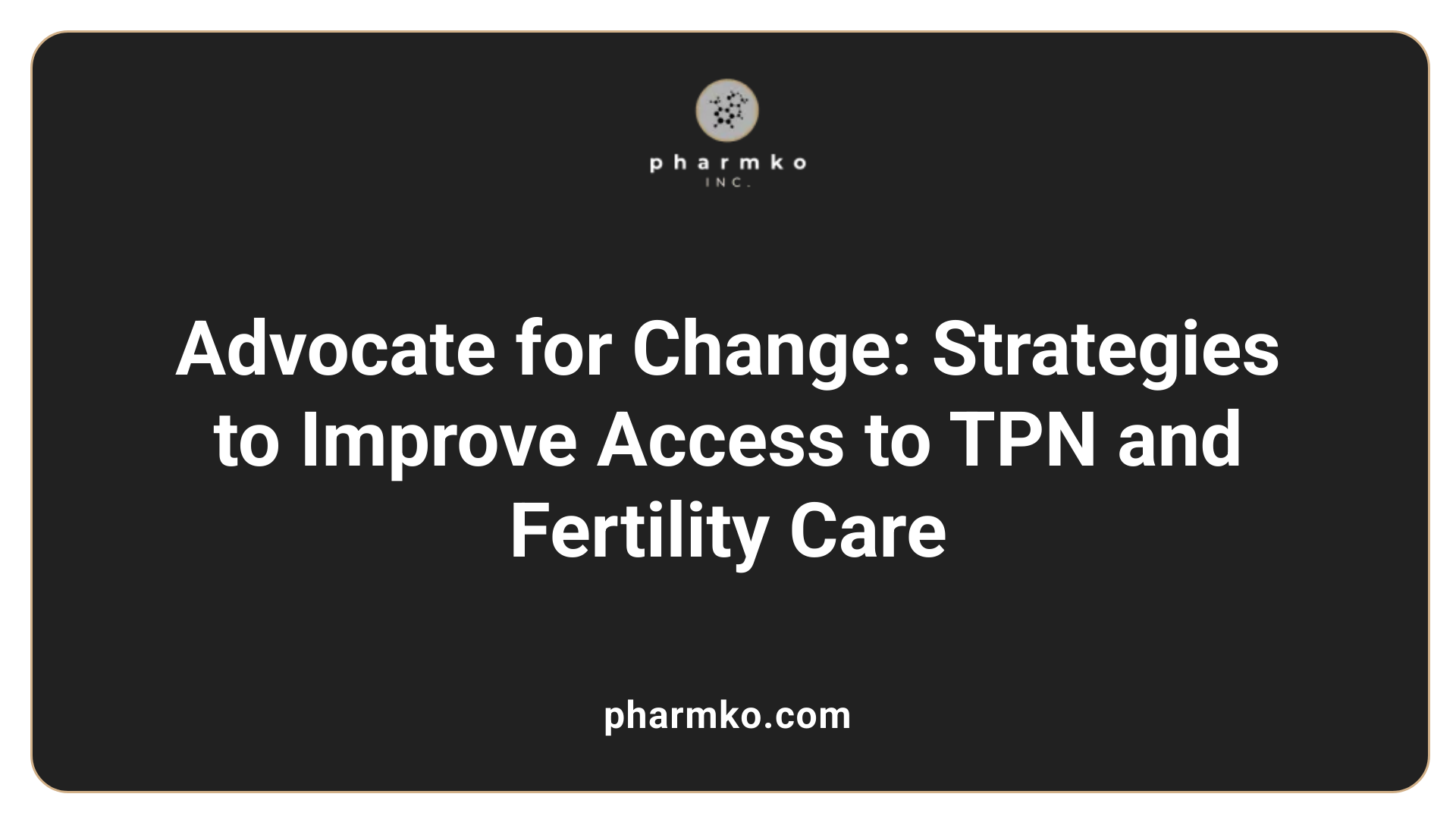
How can grassroots advocacy influence policy?
Grassroots advocacy plays a crucial role in shaping healthcare policies related to fertility treatments and nutritional support like Total Parenteral Nutrition (TPN). When individuals and communities collectively voice their concerns and needs, they can influence lawmakers to prioritize reproductive health issues.
By organizing campaigns, sharing personal stories, and participating in public hearings, advocates can highlight the importance of accessible fertility treatments and nutritional options. These efforts often lead to increased awareness among policymakers, prompting legislative action to improve coverage and access.
Such advocacy also helps break down social stigmas surrounding infertility, encouraging a broader societal understanding and support for treatment innovations like TPN, which may be essential for certain fertility procedures or related health conditions.
Partnering with organizations like RESOLVE and ASRM
Organizations such as RESOLVE: The National Infertility Association and the American Society for Reproductive Medicine (ASRM) are vital allies in fertility advocacy.
RESOLVE hosts annual events like Advocacy Day, where participants can directly meet with U.S. Congress members to speak about improving access to fertility care and coverage. These events provide training and resources to empower advocates, from individuals experiencing infertility to healthcare providers.
ASRM works closely with these efforts, supporting legislation that promotes reproductive autonomy and advances fertility treatments. Partnering with such organizations offers advocates a structured platform, access to information, and the backing needed to make impactful changes.
The significance of legislative efforts and advocacy events
Legislative efforts are essential in making systemic changes that improve access to fertility treatments like TPN. Laws that mandate insurance coverage, allocate funding for fertility research, or remove barriers to treatment can transform patient experiences.
Advocacy events, especially those like RESOLVE’s Advocacy Day, serve as powerful tools to influence legislation. They provide a space for individuals to share their stories, educate policymakers, and rally support for pro-fertility policies.
These collective efforts contribute to a shift in public policy, ensuring that fertility services are accessible and affordable. Legislative victories not only benefit those directly affected but also promote a more equitable healthcare system overall.
How can I become a fertility advocate?
To become a fertility advocate, start by educating yourself about fertility issues, treatment options, and resources such as the (In)Fertility Discourse Podcast. Get involved with organizations like RESOLVE, which empowers individuals to advocate for better fertility benefits through legislation, policy changes, and workplace support.
Participate in advocacy activities such as signing action alerts, meeting with lawmakers, and spreading awareness about infertility and treatment coverage. Sharing your personal story helps reduce stigma and encourages policy advancements that expand access to fertility care.
Stay informed on current legislation and support efforts aimed at improving fertility preservation and treatment options for everyone. Your voice can contribute significantly to improving reproductive health policies and ensuring equitable access to treatments like TPN.
Effective Communication with Healthcare Providers about TPN
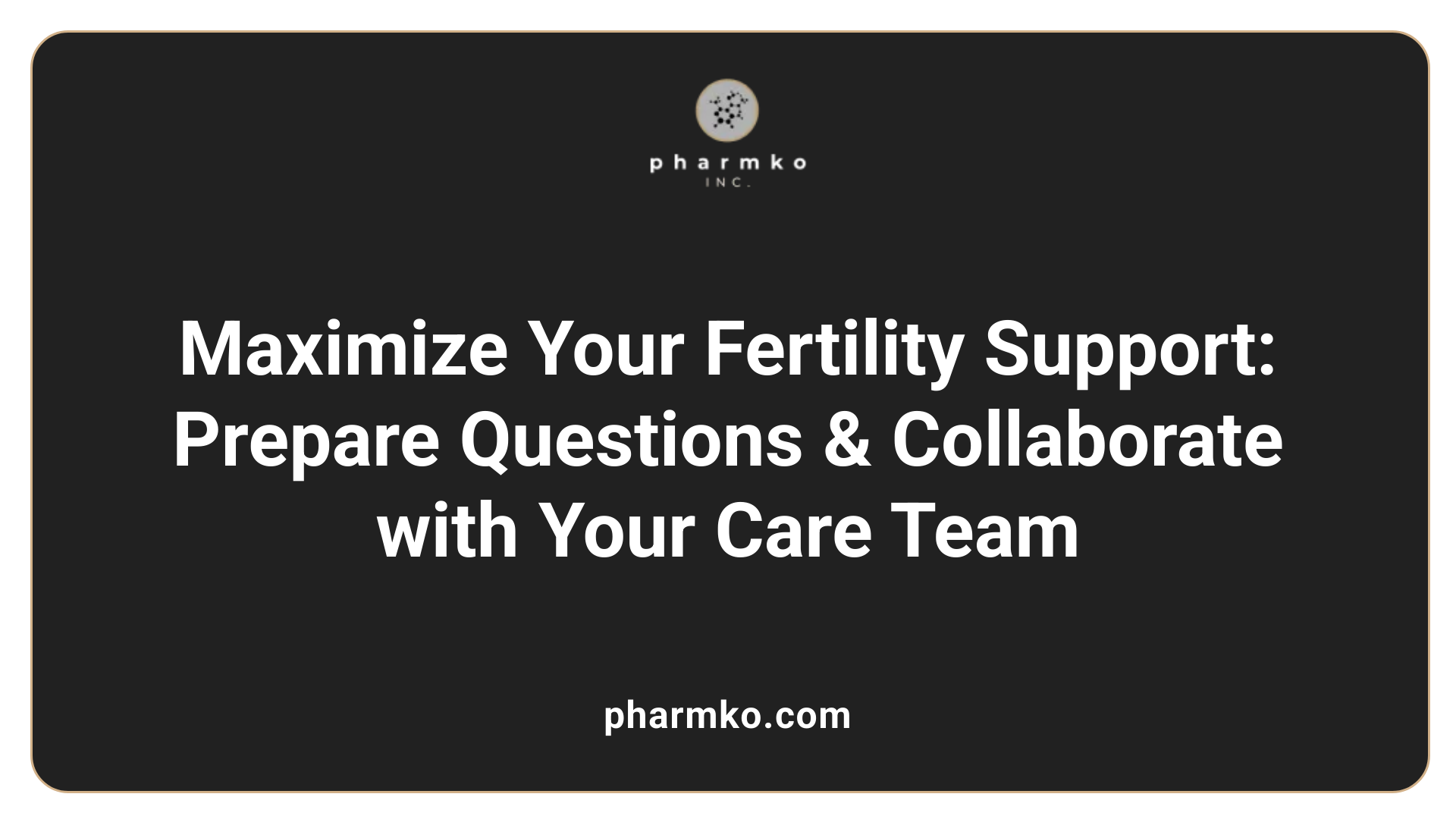
How can patients prepare questions and concerns for appointments?
Being well-prepared for healthcare appointments is essential when discussing TPN (Total Parenteral Nutrition) options as part of fertility care. Patients should write down specific questions and concerns beforehand to ensure they cover all important topics during consultations. For example, inquiries might include how TPN fits into their overall treatment plan, potential risks or side effects, and what to expect during therapy. Preparing written notes helps in remembering and articulating these questions clearly, leading to more productive discussions.
How can patients collaborate with multidisciplinary care teams?
Successfully managing TPN requires coordination among various healthcare providers such as fertility specialists, nutritionists, pharmacists, and nurses. Patients should actively engage with each team member and seek clear explanations about how their roles contribute to treatment. Establishing an open line of communication ensures everyone is aligned on goals and care protocols. Sharing updates about symptoms, side effects, and nutritional status can help clinicians make timely adjustments. Being proactive in asking for overviews and clarification fosters a supportive environment where patients feel empowered in decision-making.
What strategies help in monitoring and reporting treatment progress?
Continuous monitoring is vital for safe and effective TPN management. Patients are encouraged to keep detailed records of their symptoms, nutritional intake, and any side effects or complications such as infections or discomfort. Keeping a journal or digital log facilitates accurate reporting during appointments. Regularly communicating with the healthcare team about these observations helps in early detection of issues and ensures treatment remains tailored to their needs. Adhering to prescribed protocols and promptly reporting any concerns further enhances treatment success.
Questions and Answers:
What are the best ways to communicate with healthcare providers about TPN options?
To effectively communicate with healthcare providers about TPN options, ensure you ask clear, specific questions regarding your treatment plan and any concerns you have. Bring relevant research, questions, or patient experiences to discussions to facilitate understanding and shared decision-making. Engage with a multidisciplinary team—including clinicians, pharmacists, dietitians, and nursing specialists—and keep open communication while accurately documenting your symptoms, side effects, and any issues. Follow your healthcare provider’s instructions closely, and report any signs of complications such as infections or changes in your condition promptly. Additionally, educate yourself about TPN management, including proper care, monitoring, and how to involve support networks, to foster a collaborative and informed approach to your treatment.
Educational Foundations: Benefits, Risks, and Considerations of TPN
What are the benefits and considerations of TPN in fertility treatments?
Total Parenteral Nutrition (TPN) is a specialized method of delivering essential nutrients directly into the bloodstream through an intravenous line. In the context of fertility care, TPN can play a supportive role for individuals who face difficulties absorbing nutrients due to gastrointestinal issues or severe malnutrition. Ensuring good nutritional status is critical when preparing for conception, as it supports overall health and optimizes the chances of a successful pregnancy.
One of the main benefits of TPN is its ability to prevent nutritional deficiencies in patients unable to intake or digest nutrients normally. This support can be a vital step in stabilizing health before pursuing fertility treatments or pregnancy.
However, using TPN also involves important considerations. First, it is an expensive treatment, requiring specialized equipment and close medical supervision. The risks associated with TPN include infections at the infusion site, potential liver damage, and electrolyte imbalances. These complications highlight the need for continuous monitoring by healthcare professionals.
Deciding whether TPN is appropriate depends on an individual’s health profile. It should be considered as part of a comprehensive care plan tailored to the person's unique needs, with ongoing assessments to address any emerging issues. While TPN itself is not a direct fertility treatment, improving overall health and nutritional status through this method can support reproductive goals.
Supporting overall health and nutritional balance.
Ensuring proper nutrition through TPN can help optimize reproductive health, reduce the risk of complications, and prepare the body for pregnancy.
Monitoring for potential complications.
Regular oversight is essential to detect and manage risks such as infections or metabolic disturbances, safeguarding patient well-being.
Assessing individual health needs.
Each patient’s health status determines the appropriateness of TPN, emphasizing the importance of personalized medical guidance.
Why is patient education and advocacy important in fertility care?
Understanding treatment options like TPN, and actively engaging in discussions with healthcare providers, empowers patients to make informed decisions. Advocating for access to comprehensive fertility treatments and nutritional support can improve health outcomes and reproductive autonomy.
Supporting this effort, organizations like RESOLVE and ASRM organize advocacy events, including annual Virtual Advocacy Day, to influence legislation and raise awareness. These initiatives aim to increase insurance coverage and access to fertility care, including advanced treatments like TPN if applicable.
Overall, combining informed decision-making, clear communication with healthcare teams, and active advocacy helps ensure patients receive the necessary support for successful family building.
Community Engagement and Policy Advocacy
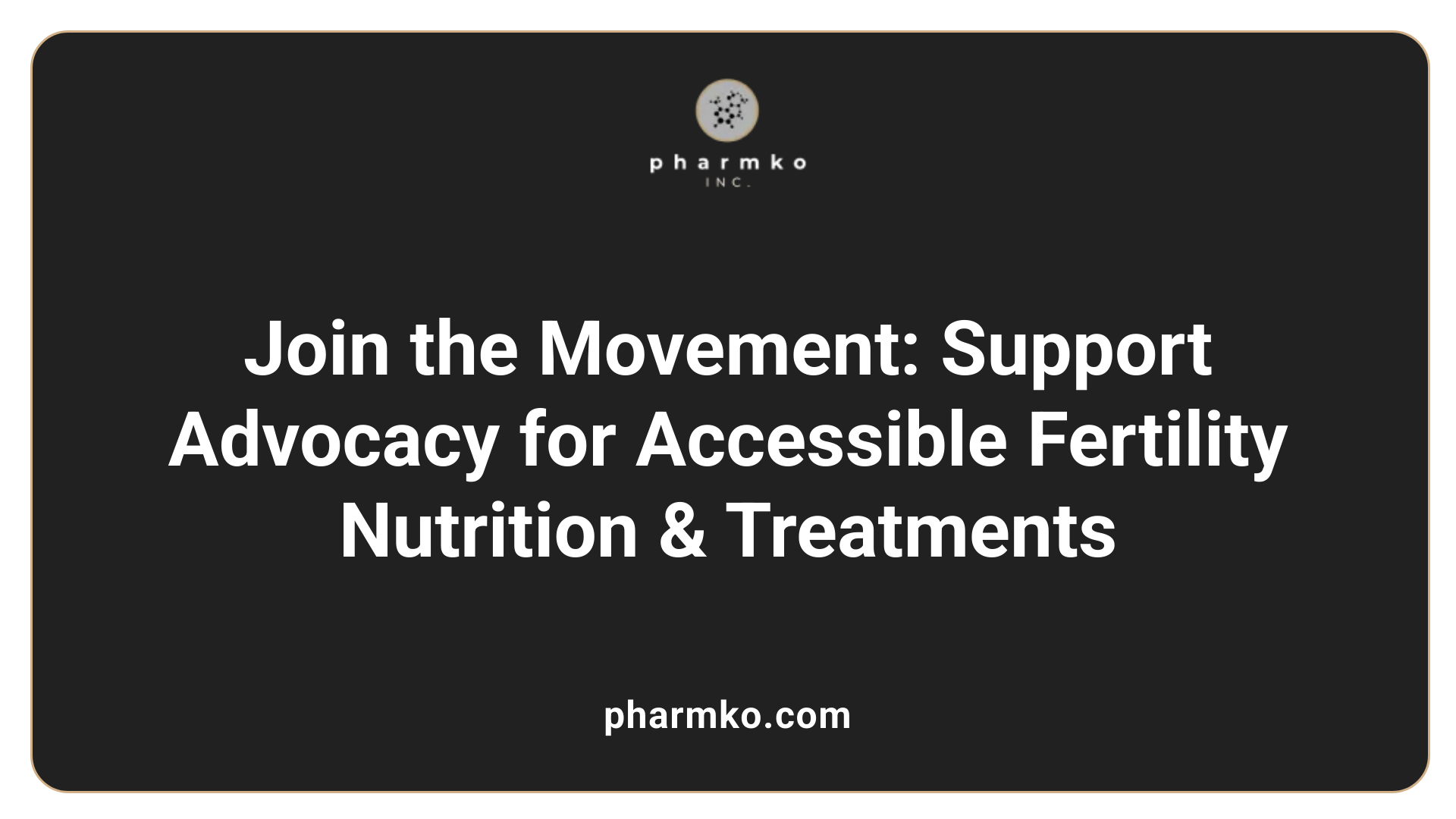
How can the fertility community support advocacy for TPN?
Total Parenteral Nutrition (TPN) is a specialized nutritional support often important for individuals undergoing fertility treatments with complex health needs. Supporting advocacy efforts for TPN involves multiple approaches.
First, community members can raise awareness by sharing personal stories and educational content. Social media campaigns, especially during National Infertility Awareness Week (NIAW), help spotlight the importance of comprehensive care, including nutritional support like TPN.
Engagement with policymakers is crucial. Writing letters, participating in advocacy campaigns such as #WearOrange, and supporting legislation like the IVF for Military Families Act can influence policymakers to prioritize access to fertility treatments and related healthcare support.
Building strong support networks—both online and in person—mirrors efforts by organizations like RESOLVE. These groups can offer emotional encouragement and empower individuals to speak out for themselves.
Collaboration with medical organizations like the American Society for Reproductive Medicine (ASRM) amplifies advocacy efforts. Joint policy initiatives and educational outreach help promote equitable access to advanced treatments such as TPN.
Finally, enhancing public understanding of the medical, emotional, and logistical challenges faced by those requiring TPN is essential. Destigmatizing these experiences fosters greater acceptance and can influence legislative and healthcare policies to better support fertility patients.
Why is advocacy important in increasing reproductive autonomy?
Infertility affects 1 in 5 individuals in the U.S., yet access to necessary treatments remains uneven. Advocacy campaigns aim to change stories, influence legislation, and ensure all patients have access to the care they need. Efforts like those coordinated by RESOLVE and ASRM highlight the importance of fighting for equitable healthcare and insurance coverage for fertility treatments—including nutritional support like TPN—thus expanding reproductive choices and supporting family-building options.
Community support and policy advocacy in action
| Activity | Description | Impact |
|---|---|---|
| Awareness Campaigns | Sharing personal stories and educational materials | Raises public understanding and reduces stigma |
| Legislative Engagement | Writing letters, participating in events like #WearOrange | Influences policy and funding priorities |
| Support Networks | Joining organizations like RESOLVE | Provides emotional support and empowerment |
| Medical Partnership | Collaborating with ASRM and clinics | Promotes policy changes for equitable access |
By actively engaging in these efforts, the fertility community can play a vital role in shaping policies that ensure all individuals have the support they need, including access to treatments like TPN, for reproductive health and family-building goals.
Legislative and Policy Landscape: Influencing Access to TPN in Fertility Care
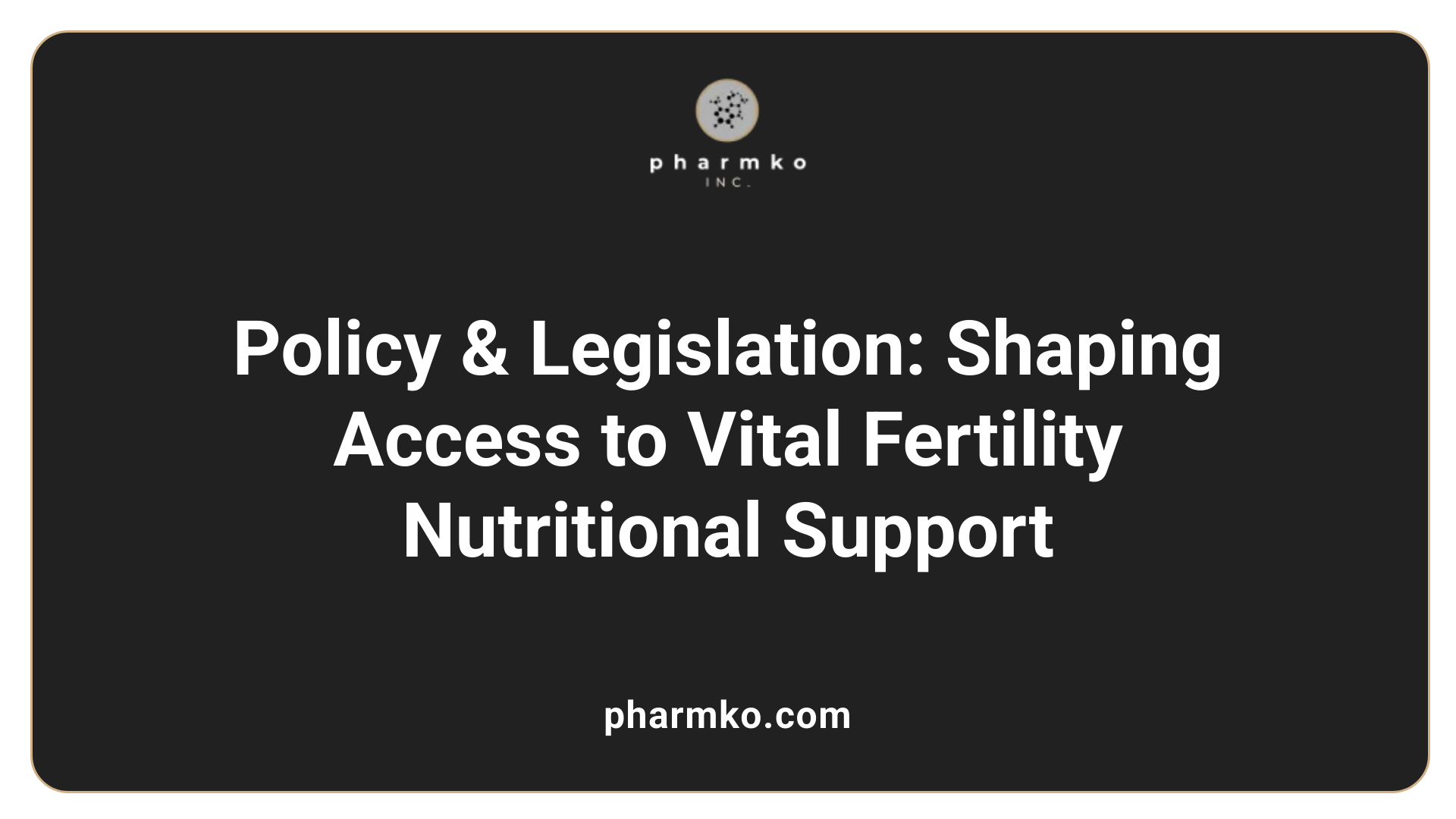
What legislative or policy factors influence access to TPN in fertility treatments?
Access to Total Parenteral Nutrition (TPN) in fertility care depends heavily on the broader legislative and policy environment. These factors shape what treatments are covered, protected under law, and available to patients across different states and at the federal level.
Federal legislation plays a vital role by proposing mandates that require insurance companies to cover various fertility treatments. Bills advocating for comprehensive coverage of in-vitro fertilization (IVF) and other reproductive services help reduce out-of-pocket costs and improve treatment accessibility. For instance, some laws aim to include advanced nutritional support like TPN when it is medically necessary for fertility procedures.
State laws are also significant. Certain states have passed mandates that extend insurance coverage for fertility preservation and assisted reproductive technology (ART). For example, some states require Medicaid programs to cover fertility-related treatments, which can encompass nutritional support for patients undergoing complex procedures.
Legal protections are equally crucial. The fight for reproductive autonomy includes efforts to legalize and protect access to fertility treatments under changing legal landscapes. Initiatives like the proposed Right to IVF Act seek to guarantee the right to access IVF treatments while shielding providers from legal challenges. These legislative efforts highlight the ongoing debates and politicization surrounding reproductive rights.
In summary, legislative and policy frameworks at both levels directly impact the availability and affordability of treatments like TPN in fertility care. They establish what services are accessible to patients, how protected their healthcare rights are, and what financial support they can expect.
| Policy Aspect | What It Covers | Impact on TPN Access |
|---|---|---|
| Federal Legislation | Insurance mandates, reproductive rights laws | Aims to expand coverage and protect access for all patients |
| State Laws | Medicaid coverage, reproductive health mandates | Increases local access and affordability |
| Legal Protections | Rights to fertility treatments, provider safeguards | Ensures ongoing access amid legal challenges |
Understanding these factors can help patients advocate for their needs and seek supportive care environments.
Incorporating TPN into Broader Infertility Awareness and Education
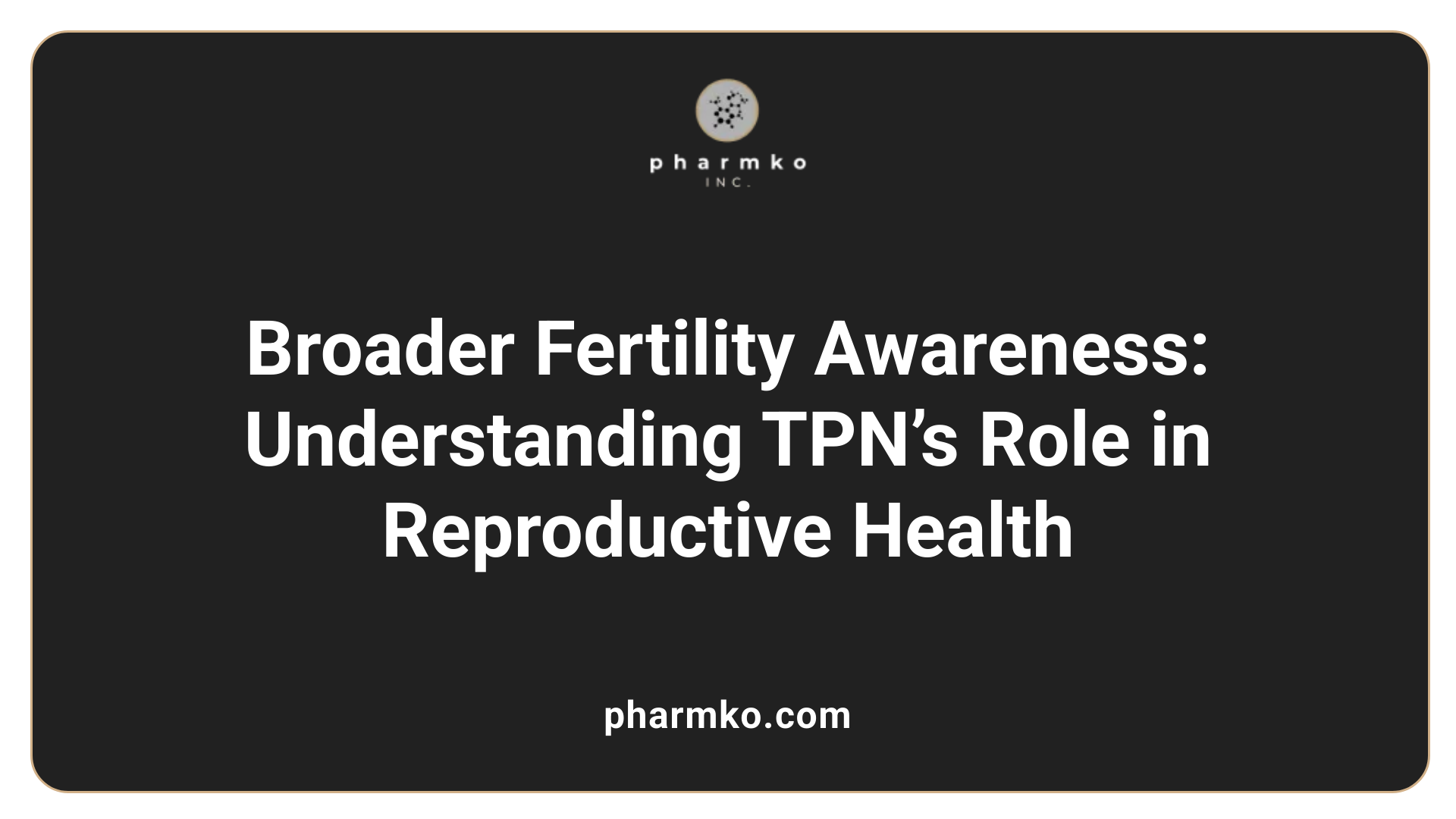
How is TPN incorporated into broader infertility awareness and education efforts?
Total Parenteral Nutrition (TPN) is primarily a medical procedure used to deliver essential nutrients directly into the bloodstream for patients with severe digestive or nutritional issues. While TPN is not a standard part of fertility treatments, it plays a crucial role in the broader context of reproductive health, especially for individuals with underlying conditions that may impair their ability to absorb nutrients properly.
Integrating information about TPN into infertility and reproductive health initiatives involves educating both patients and healthcare providers about its significance. Education campaigns can emphasize the importance of nutrition and metabolic support in achieving optimal reproductive outcomes. For instance, during preconception planning or fertility treatments, health professionals may consider nutritional status as a vital component. In such cases, TPN might be necessary to improve overall health, thereby increasing the chances of successful conception.
Support groups and clinics, such as Boston IVF, can incorporate discussions about how nutritional health impacts fertility. They can inform patients about signs that indicate a need for nutritional interventions like TPN and stress the importance of comprehensive care. Additionally, awareness programs can highlight safety and monitoring protocols to prevent complications associated with TPN, including infections or metabolic imbalances.
Public health campaigns and professional education sessions should aim to dispel misconceptions about nutrition and fertility. Clarifying that TPN is suited for specific health conditions, rather than being a direct fertility treatment, helps set realistic expectations. Moreover, these efforts can promote a holistic view of reproductive health, acknowledging that proper nutrition and medical support are integral to fertility.
Overall, the goal of incorporating TPN education into reproductive health initiatives is to broaden understanding of comprehensive patient care. By doing so, healthcare providers can better support individuals with complex medical needs, ensuring that nutritional support like TPN is used responsibly and effectively in the context of fertility and reproductive health care.
Advocating for Holistic and Accessible Fertility Care
Empowering individuals with knowledge, strategic advocacy, and active engagement with healthcare providers and policy makers can significantly improve access to comprehensive fertility treatments, including TPN. As part of a broader movement for reproductive autonomy, promoting awareness about supportive therapies like TPN ensures that all patients receive the tailored, holistic care they need to build their families. By fostering collaborations among medical professionals, advocacy organizations, and patients, the fertility community can pave the way for more inclusive, equitable fertility care practices that prioritize health, well-being, and reproductive rights.
References
- Top 10 Tips for Advocating for Yourself During Your Infertility Journey
- Infertility Advocacy Day: Why It Matters & How to Get Involved
- Total Parenteral Nutrition | TPN Administration & Considerations
- RESOLVE: The National Infertility Association: Homepage
- Advocacy - Alliance for Fertility Preservation
- Become an Infertility Advocate for Change - Fertility Answers
- Top 10 Tips for Advocating for Yourself During Your Infertility Journey













